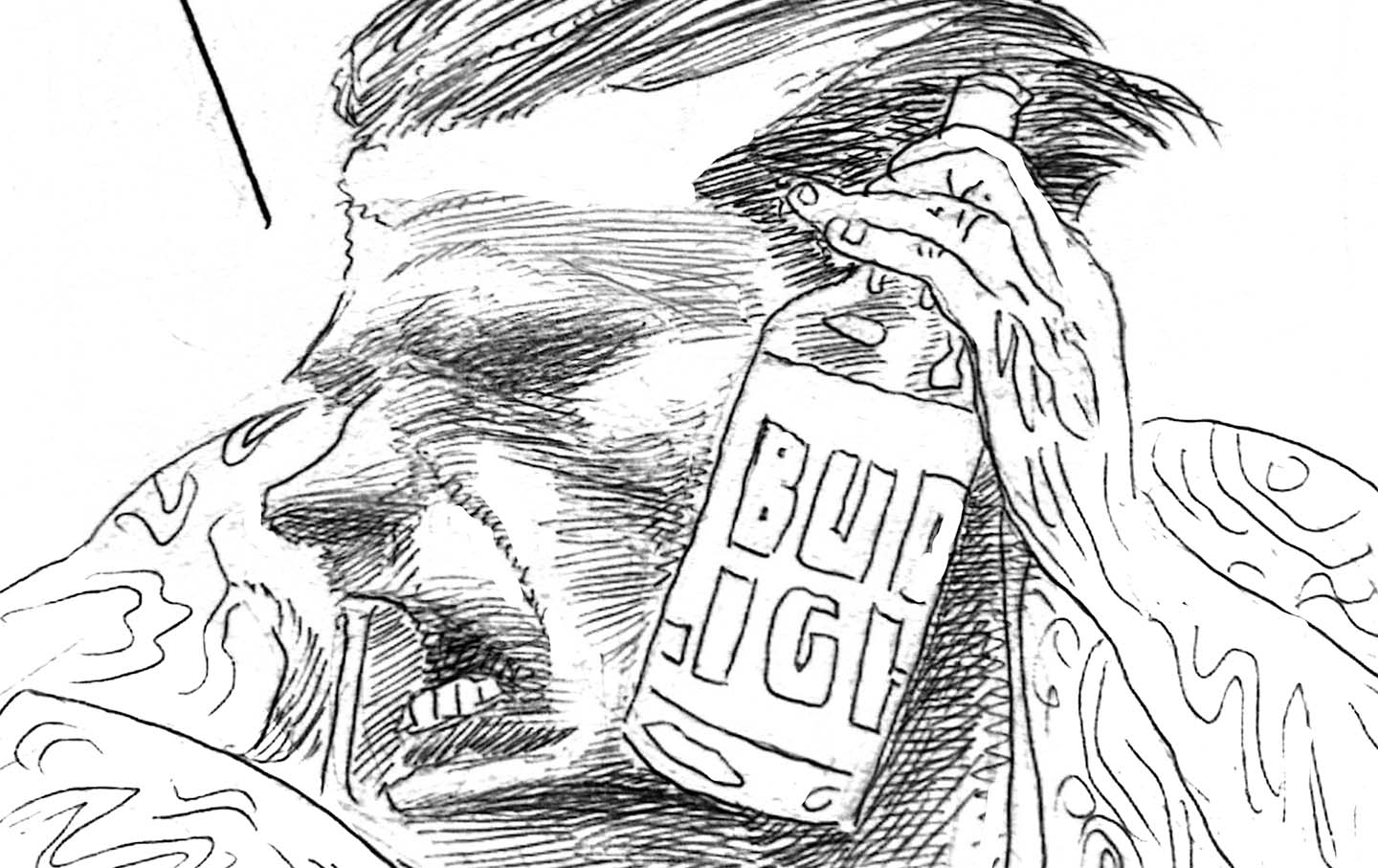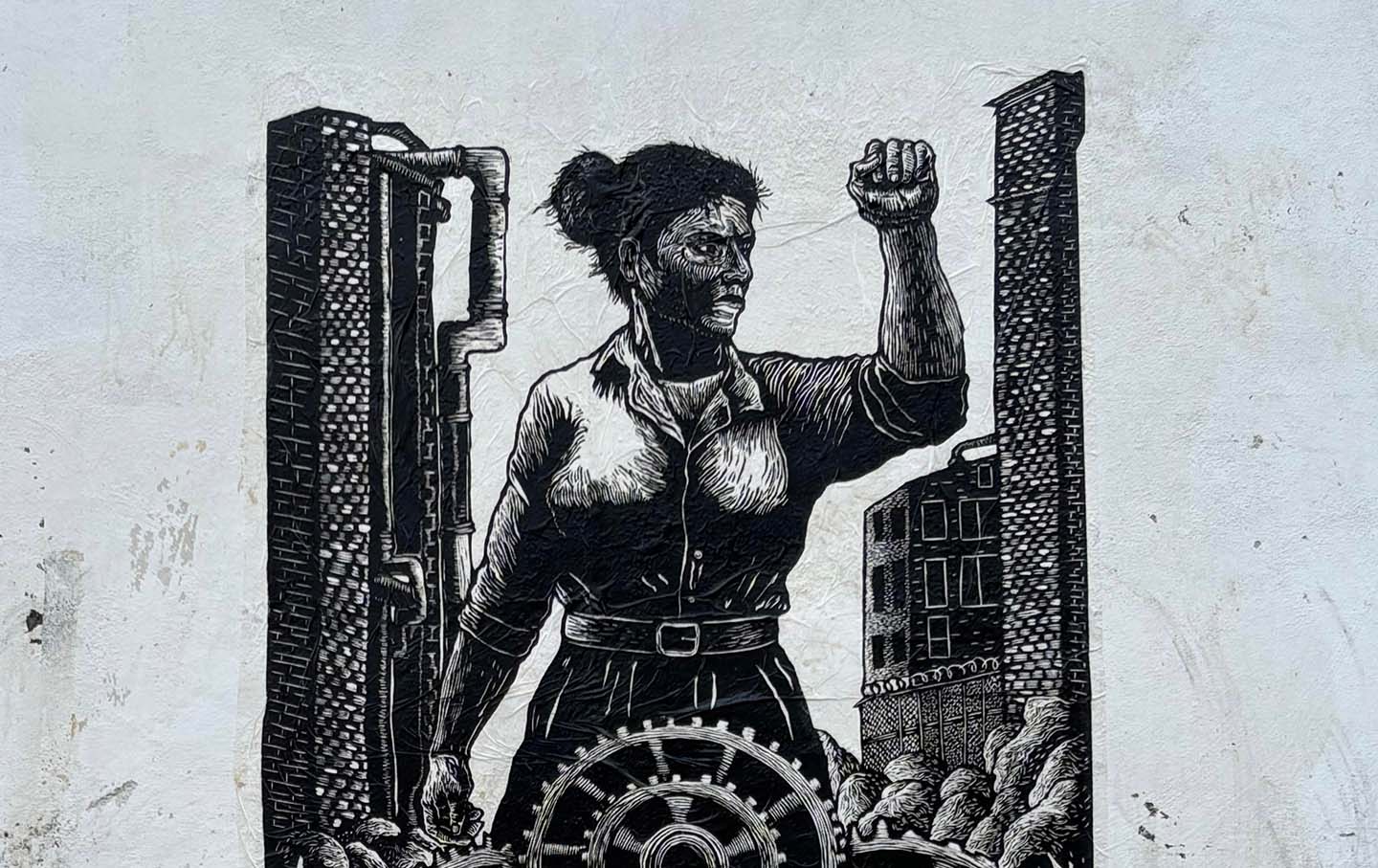Economic Anxieties Reigned Supreme in Western States
This is not the column I thought I would be writing this week.

An election worker raises a flag while assisting voters at a polling station Las Vegas, Nevada, on Election Day, November 5, 2024.
(Ronda Churchill / AFP)
Ihad hoped to be writing about how a handful of Californian, Nevadan, and Arizona House seats had flipped to Democrats in yesterday’s election, and how that was the contributing factor for the Democrats taking control of the House of Representatives. I had planned, too, to write on some interesting ballot initiatives—abortion-rights initiatives in Nevada and Arizona, and a minimum-wage initiative and Prop 36 in California.
But then came, well, the presidential election results, rendering everything else pretty much infinitesimal.
So, briefly, I’ll mention the state of things around the House races and the initiatives, and then move onto Groundhog Day circa either 2016 or 1933.
In Arizona, Democrats had high hopes of picking up congressional districts one and six, and the early counting last night showed them on a winning trajectory. As of this writing, with nearly 60 percent of the vote having been counted, the Democratic challenger Kirsten Engel is holding a narrow lead over GOP incumbent Juan Ciscomani, but in district one Amish Shah’s lead disappeared overnight and it looks quite likely the Republicans will keep that seat. There are, though, still a lot of votes left to count, and it’s likely neither result will be known for days, possibly weeks. Elsewhere, the Reno-area House seat that the Democrats hoped to flip stayed solidly red.
Meanwhile, Ruben Gallego looks set to win the Senate seat in Arizona, but incumbent Jacky Rosen is trailing Republican Sam Brown by 1,000 votes in Nevada, with more than 80 percent of the votes counted. That result will likely change by the time all the votes are counted, but it’s clear that if she wins, Rosen will have eked out a narrow victory in a race that most polls had her winning comfortably.
Even in solid-blue California, the Democrats are struggling to convert winnable seats in the Central Valley and the Los Angeles conurbation. In district 40, where the GOP incumbent was seen as vulnerable, the GOP looks like it will win in a cakewalk. So, too, in District 13, in the Central Valley, as of now it looks like the Democrat will fall just shy of victory (though with only half of the votes tabulated, that could well change). In other words, up and down the ballot, from House and Senate races to the presidency, Democrats significantly underperformed on Tuesday—a consequence both of Biden’s unpopularity, which Harris apparently inherited, and of Trump’s unfathomable appeal to huge swaths of the populace.
It wasn’t that voters were in a uniformly reactionary mood. In fact, the electorate in both Nevada and Arizona passed constitutional amendments protecting abortion rights. And in Arizona, the ballot measure is expected to expand access to abortion care once in effect. Yet, on select issues, around security and around the economy, especially inflation, voters took a sharp turn rightward.
In California, it looks likely that voters will nix an increase in the minimum wage, fearing a surge in inflation. Perhaps more significantly, by an overwhelming margin, the electorate passed Proposition 36, which increases criminal penalties for low-level property and drug crimes, and, in doing so, eviscerates the funding stream voters created by Prop 47, in 2014, for rehabilitation services funded by savings from incarcerating fewer people.
I think the abortion and criminal justice propositions offer a larger window into the mood of the electorate nationally yesterday.
Many voters I met in Arizona and Nevada over the last few weeks indicated that they were supportive of abortion rights—echoing decades of polling data confirming the same to be true among the majority of Americans—but at the same time were intending to vote for Donald Trump because they were in a tizzy about a supposedly dire economy. (Fact-check: By pretty much any measure, the economy is not all that dire right now.) They were also angered over the way the border had been handled under Biden; had been riled up by Trump and his allies’ increasingly extreme message, to conflate immigration and crime; and, to top it off, had been fed a steady diet of horror stories about out-of-control shoplifting gangs and violent criminals, despite the fact that crime has actually been falling in much of the country for the past couple years.
And so they opted to protect the rights that they cared about at a state level (like abortion rights), while handing the vast powers of the federal government over to an overt fascist. They gave the presidency to someone who promised to clean up the mess by unleashing the police to inflict a “very tough hour” on crime suspects; to deploy the military and its arsenal of weaponry on civilian protesters; to hunt down undocumented immigrants, house them in vast detention (read “concentration”) camps, and then summarily deport them; to ban all asylum seekers and refugees; to cozy up to dictators with a transactional foreign policy that can only eviscerate the democratic world; and to threaten vast tariffs on noncooperative trading partners, even though those tariffs will boomerang back on consumers.
How did these ghastly, fundamentally undemocratic policies, which fly in the face of centuries of American policy and culture, acquire even a veneer of legitimacy? Because, in the post-truth age, a social-media-generated image really is everything. And when the world’s richest man, who owns one of the world’s most widely used social media systems, turns all of that might into a 24/7 propaganda machine, really bad things follow in its wake.
Elon Musk did everything he could to wrap the electorate up in a pretty bow and hand it over to his buddy Trump, in exchange for a promise to be given huge powers to eviscerate the regulatory state that might occasionally hold him back from acquiring even more oligarchic power.
There are multiple villains responsible for yesterday’s shameful election results. But Musk stands out for the sheer scale of his influence and support of Trump’s reelection campaign.
Popular
“swipe left below to view more authors”Swipe →Meanwhile, there’s clearly much work to be done to try to limit the unfathomable damage that Trump and his gangster government will now be free to inflict on people in the United States and around the world.
Tears today, sleeves rolled up tomorrow.
Support independent journalism that exposes oligarchs and profiteers
Donald Trump’s cruel and chaotic second term is just getting started. In his first month back in office, Trump and his lackey Elon Musk (or is it the other way around?) have proven that nothing is safe from sacrifice at the altar of unchecked power and riches.
Only robust independent journalism can cut through the noise and offer clear-eyed reporting and analysis based on principle and conscience. That’s what The Nation has done for 160 years and that’s what we’re doing now.
Our independent journalism doesn’t allow injustice to go unnoticed or unchallenged—nor will we abandon hope for a better world. Our writers, editors, and fact-checkers are working relentlessly to keep you informed and empowered when so much of the media fails to do so out of credulity, fear, or fealty.
The Nation has seen unprecedented times before. We draw strength and guidance from our history of principled progressive journalism in times of crisis, and we are committed to continuing this legacy today.
We’re aiming to raise $25,000 during our Spring Fundraising Campaign to ensure that we have the resources to expose the oligarchs and profiteers attempting to loot our republic. Stand for bold independent journalism and donate to support The Nation today.
Onward,
Katrina vanden Heuvel
Editorial Director and Publisher, The Nation








